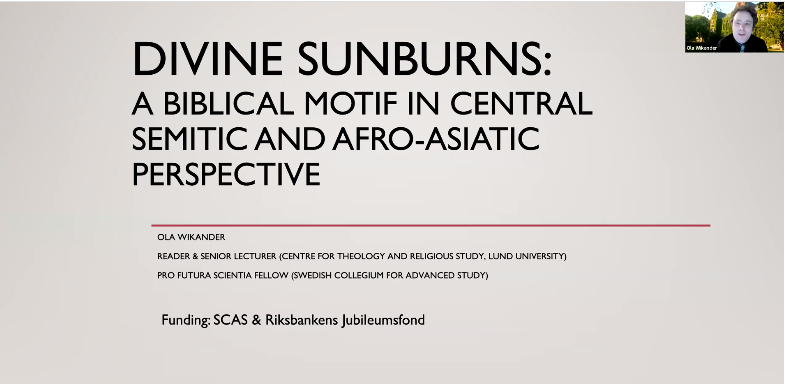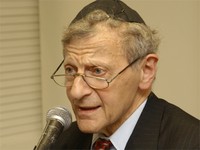Dr Ola Wikander (University of Lund) discusses ‘Divine Sunburns: A Biblical Motif in Central Semitic and Afro-Asiatic Perspective’ in this Biblical Studies Seminar at the University of Edinburgh on February 11, 2021.

Symposium website “The Social Worlds of Early Christians: A Symposium in Honor of L. Michael White” includes recorded presentations and live Zoom panel discussions (October 24, 2020, at 10:00am, 1:00pm, and 3:00pm CST). Registration is free, but required (scroll down to the bottom of the page to sign up).

On May 19, 2020, Professors John Kloppenborg and Chris Keith had a Zoom discussion on Kloppenborg’s recent book, Christ’s Associations (Yale UP, Nov 2019).
The discussion is the sixth in the Centre for the Social-Scientific Study of the Bible’s 2020 Online Discussion Series.
From March 19-21, 2018, the Sonia and Marco Nadler Institute of Archaeology at Tel Aviv University hosted the “Priests and Priesthood in the Near East: Social, Intellectual and Economic Aspects” conference. The papers from March 19 are available on TAU’s YouTube channel:
Professor Sidnie White Crawford (University of Nebraska-Lincoln) summarises the latest scholarship on the Qumran library of 800-900 fragmentary manuscripts from the mid-third century BCE to the late first century CE, and the history of the sect responsible for the collection and its scribal/learned characteristics. Her public lecture was delivered on January 25, 2018, on the occasion of receiving a D.Theol honoris causa from the University of Uppsala.
The Bible Odyssey website provides four videos in which the late Professor Emeritus Philip Davies (1945-2018) discussed the importance of the Dead Sea Scrolls for Judaism and biblical scholarship, and the non-historicity of Kings David and Solomon.
1. Philip R. Davies on the Dead Sea Scrolls and the plurality within early Judaism.
2. Philip R. Davies on how the discovery of the Dead Sea Scrolls has affected biblical scholarship
3. Philip R. Davies on whether Solomon and David existed.
4. Philip R. Davies on what the Tel Dan inscription may or may not say.
Associate Professor Josephine Quinn (University of Oxford) discusses her book, In Search of the Phoenicians (Princeton University Press, 2017), with responses by Hindy Najman (University of Oxford) and Stephanie Dalley (Oriental Studies, University of Oxford). The panel is chaired by John Watts (University of Oxford). The panel took place on April 25, 2018, as is part of the University of Oxford’s Book at Lunchtime series.
The Phoenicians traveled the Mediterranean long before the Greeks and Romans, trading, establishing settlements, and refining the art of navigation. But who these legendary sailors really were has long remained a mystery. In Search of the Phoenicians makes the startling claim that the “Phoenicians” never actually existed. Taking readers from the ancient world to today, this monumental book argues that the notion of these sailors as a coherent people with a shared identity, history, and culture is a product of modern nationalist ideologies—and a notion very much at odds with the ancient sources.
- Torch: The Oxford Research Centre in the Humanities
Dr Christopher Zeichmann (University of Toronto) has made available a very useful database for the study of early Christianity: The Database of Military Inscriptions and Papyri of Early Roman Palestine (DMIPERP).
This site is designed to aid the study of the military in the early Roman period for those interested in Judaism and Christianity of the first few centuries CE….
DMIPERP entries are divided roughly as follows: entries 1-132 were all found in Palestine and listed in roughly chronological order; entries 133-201 were texts not found in Palestine but discuss either the military in Palestine or those of a Palestinian background (esp. Jews and Gentiles born in Palestine); entries 202-224 are all surviving military diplomas for Judaea and Syria Palaestina; entries 225-296 are military diplomas of units or people originating in Palestine; entries 297-340 are Palestinian milestones erected by the military; entries 341-362 are all known pre-Constantinian military inscriptions involving Christians. There are 372 entries in total, with new entries being added following that number.
On February 9, 2017, Professor Dale B. Martin (Yale University) gave an open lecture on ‘the family’ in ancient and modern times, at the University of Kent.
The lecture begins at 5:20.
h/t: Taylor Weaver

On December 9, 2004, Professor Louis Feldman (October 29, 1926 – March 25, 2017) lectured on the question, “Why were the Maccabees opposed to the Greek Religion and Culture?“(mp3; lecture beginning at 1:12).
The talk is made available by Yeshuva University’s YUTorah Online.
On February 25, 2015, Professor Eric Cline (The George Washington University) delivered a lecture at The Oriental Institute, University of Chicago, on the collapse of civilization at the end of the Late Bronze Age. The lecture was on the same subject as his recent book, 1177 B.C.: The Year Civilization Collapsed (2014).
For more than three hundred years during the Late Bronze Age, from about 1500 BC to 1200 BC, the Mediterranean region played host to a complex international world in which Egyptians, Mycenaeans, Minoans, Hittites, Assyrians, Babylonians, Cypriots, and Canaanites all interacted, creating a cosmopolitan and globalized world-system such as has only rarely been seen before the current day. It may have been this very internationalism that contributed to the apocalyptic disaster that ended the Bronze Age. When the end came, as it did after centuries of cultural and technological evolution, the civilized and international world of the Mediterranean regions came to a dramatic halt in a vast area stretching from Greece and Italy in the west to Egypt, Canaan, and Mesopotamia in the east. Large empires and small kingdoms, that had taken centuries to evolve, collapsed rapidly. With their end came the world’s first recorded Dark Ages. It was not until centuries later that a new cultural renaissance emerged in Greece and the other affected areas, setting the stage for the evolution of Western society as we know it today. Blame for the end of the Late Bronze Age is usually laid squarely at the feet of the so-called Sea Peoples, known to us from the records of the Egyptian pharaohs Merneptah and Ramses III. However, as was the case with the fall of the Roman Empire, the end of the Bronze Age empires in this region was not the result of a single invasion, but of multiple causes. The Sea Peoples may well have been responsible for some of the destruction that occurred at the end of the Late Bronze Age, but it is much more likely that a concatenation of events, both human and natural — including earthquake storms, droughts, rebellions, and systems collapse — coalesced to create a “perfect storm” that brought the age to an end.
– Lecture by Eric Cline on “1177 BC: The Year Civilization Collapsed“
Professor Cline also delivered a similar lecture to the National Capital Area Skeptics, on October 8, 2016, in Bethesda, Maryland:
On January 17, 2017, Professor Francesca Stavrakopoulou (University of Exeter) was interviewed by Dan Snow (BBC) on the History Hit podcast. The topic is “The Historical Reliability of the Bible“, and Professor Stavrakopoulou provides a summary of mainstream scholarship on the historicity of the Hebrew Bible / Old Testament.
The interview is available in mp3 audio format (28:56).
Videos are available from a colloquium held at Heythrop College, University of London from 29th-30th July 2016 on the topic of literacy and education in the ancient world: “Bookish Circles: Teaching and learning in the ancient Mediterranean”.
Friday 29th July 2016
Jonathan Norton, Director of the Heythrop Centre for Textual Studies, Introduction
Sacha Stern, University College London, “Literacy, teaching and learning in Rabbinic Judaism”
Jonathan Gorsky, Heythrop College London, “Torah piety: The development of Torah learning as a focal religious endeavour” [no video]
Ingo Kottsieper, Westphalian Wilhelms University, Münster, “Literacy and Aramaic as written language in the Achaemenid Empire”
James K. Aitken, University of Cambridge, “Learning among Jewish social groups in Ptolemaic Egypt”
Joan Taylor, King’s College London, “4Q341: A Writing Exercise Remembered”
Saturday 30th July 2016
Sean Adams, University of Glasgow, “Sympotic learning: Symposia literature and cultural education”
Sean Ryan, Heythrop College London, “Greco-Roman education, ‘mental libraries’, and the Book of Revelation”
Steve Smith, University of Chichester, “Reading the New Testament in the Context of Other Texts: a Relevance Theory Perspective”
Jonathan Norton, “…not beyond what is written: How Paul uses literacy to manipulate social differential”
The late African biblical scholar Dr. Peter Flint delivers a lecture introducing the Dead Sea Scrolls and their relevance for understanding the New Testament, on January 16, 2012 at El Shaddai Ministries, Tacoma, WA.
Jacob Neusner (July 28, 1932 – October 8, 2016) delivers a talk on Modern Judaism, in which he claims that it is “not unique”, and in fact repeats changes which occurred from the 7th to the 3rd centuries BCE. The talk was delivered on March 16, 1974, at Temple Beth Sholom, Montreal, and is entitled, “A New Interpretation of the Modern Period in the History of Judaism”.
The talk is available in four parts:
“